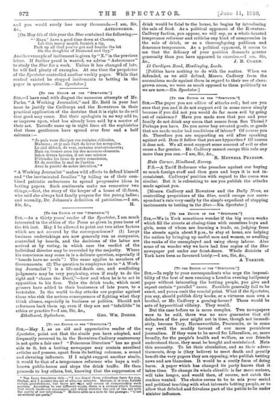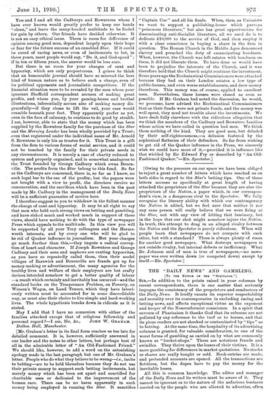Pro THE EDITOR OF THE "SrEcTsros."] SIR, —In reply to your
correspondents who urge the impossi- bility a the best of men running a London evening halfpenny paper without interesting the betting people, you give and repeat certain "parallel" cases. Parallels generally fail to be exact, and yours omit the crucial point. What if the Spectator, you say, should publish dirty books, or a virtuous man own a brothel, or Mr. Cadbury a gaming-house P These would be acts of hypocritical villainy. They would.
But the case before us is more complex. Two newspapers were to be sold, there was no sure guarantee that old defenders of the poor might not in time, though not immedi- ately, become Tory, Harmsworthite, Pearsonite, or in some way swell the muddy torrent of our more pernicious journalism. If they were to be saved for Liberalism, or, more broadly, for the people's health and welfare, as our friends understand them, they mast be bought and maintained. Note this necessity. To let their circulation, and so their adver- tisements, drop is (they believe) to meet death and greatly benefit the very papers they are opposing, who publish betting news and are blameless. It would be a costly form of doing harm. A paper which has changed its party knows that it takes time. To change its whole clientele is far more serious, will take longer, and would then, of course, not catch the readers wanted. The choice seems to be to mix your social and political teaching with what interests betting people, or to allow that deluded and frivolous part of the public to lie under sinister influence. You and I and all the Cadburys and Rowntrees whom I have ever known would greatly prefer to keep our bands "clean," and leave the many-headed multitude to be fooled for gain by others. Our friends have decided otherwise. It is not an easy ethical issue. There is room for difference of opinion among good men, dependent largely upon their hope or fear for the future success of an ennobled Star. If it could be cured of racing news, or even of incitements to bet, in three years, most people would say, "Do it, and God-speed " ; if in ten or fifteen years, the answer would be less sure.
But there is no room for your charges of cant and hypocrisy, which are only preposterous. I grieve to think that an honourable journal should have so misread the best kind of human nature as to believe such a charge, even of its political opponents and journalistic competitors. If the financial situation were to be revealed by the men whom your ignorant Sheffield correspondent accuses of making great profits, and whom you, by your gaming-house and brothel illustrations, inferentially accuse also of making money dis- gracefully—if they chose to lift the veil, your case would crumble beneath your feet. They apparently prefer as yet, even in the face of calumny, to continue to do good by stealth. I am, however, able to state that the money which has been supplied by the Rowntree family for the purchase of the Star and the Morning Leader has been wholly provided by a Trust; even that registered under the individual name of Mr. Arnold S. Rowntree is only his as trustee for it. This Trust is a gift from the firm to various forms of social service, and it could not be touched by the family for their private needs in any circumstances. It is merely a case of charity reduced to system and properly organised, and is somewhat analogous to the Trust founded by George Cadbury which owns Bourn- rine. The profits from the Star belong to this fund. So far as the Cadburys are concerned, there is, so far as I know, no such legal bar to the use of the profits ; but the papers were not bought with a view to profit, the directors receive no remuneration, and the sacrifices which have been in the past made by Mr. Cadbury in the management of the Daily News will be a sufficient guarantee of motive here.
I therefore suggest to you to withdraw in the fullest manner the charge of cant and hypocrisy. It may be all right to say that men who hold such strong views on betting and gambling, and have risked much and worked much in support of those views, should have nothing to do with the type of newspaper Press which appeals to the multitude. In this view you will be supported by all your Tory colleagues and the Harms- worth interests, and by every one who will be glad to be rid of Quaker influence in journalism. But your charges go much further than this,—they impute a radical corrup- tion of heart and character. If Joseph Rowntree and George Cadbury and their sons and nephews are canting hypocrites, as you have so repeatedly called them, then their model villages of Barwick and Bournville are frauds got up for money-making or advertisement, the many agencies for the healthy lives and welfare of their employees are but crafty devices intended somehow to get a better quality of labour —a result which certainly and inevitably has occurred—and the standard books on the Temperance Problem, on Poverty, on Women's Wages, on Land Tenure, which they have labori- ously written must be accounted for in some discreditable way, as must also their choice to live simple and bard-working lives. The whole hypothesis breaks down in ridicule as it is stated.
May I add that I have no connexion with either of the families attacked except that of religious fellowship and
personal regard ?—I am, Sir, &c., JOHN W. GRAHAM.
Dalton Hall, Manchester.
[Mr. Graham's letter in its final form reaches us too late for detailed comment. It is, however, sufficiently answered in our leader and the notes to other letters, but perhaps best of all in the admirable letter of " An Old-Fashioned Friend." We should like, however, to add a word on the astonishing apology made in the last paragraph but one of Mr. Graham's letter. People who do what they believe to be wrong—i.e., incite to betting—ire to be held blameless because they do not use their private money to support such betting incitements, but merely money which has been set apart and sanctified for charitable uses or dedicated to the improvement of the human race. There can be no harm apparently in such money being employed in running the Star. It sanctifies " Captain Coe" and all his finals. When, then, as Unionists we want to support a publishing-house which purveys " poisonous literature," but also has great opportunities for disseminating anti-Socialist literature, all we need do is to dedicate £10,000 to the service of God, and then employ it with a clear conscience in buying a share in the firm in question. The Roman Church in the Middle Ages denounced slavery and preached the duty of emancipating bondmen. When, however, the Church was left estates with bondmen on them, it did not liberate them. To have done so would have been to prejudice the interests of the Church, and it was therefore held that the Church might continue the investment. Some years ago the Ecclesiastical Commissioners were attacked because they had on their London estates a low type of public-houses, and even worse establishments, and drew money therefrom. This money was, of course, applied to excellent uses. Nevertheless, these houses were closed as soon as possible. If Mr. Graham had noted the discussion, he would, we presume, have advised the Ecclesiastical Commissioners that as their funds were not private funds, and the money was well spent, they need not trouble about the investments. We have dealt fully elsewhere with the ridiculous allegation that we think the members of the Cadbury and Rowntree families whose action we have called in question bad men. We think them nothing of the kind. They are good men, but deluded by their self-righteousness,—a delusion fostered by the sophistical flatteries of their defenders. So far from wishing to get rid of the Quaker influence in the Press, we sincerely wish we could have more of it,—provided it is influence like that wielded by Sir Edward Fry or described by "An Old- Fashioned Quaker."—En. Spectator.] [Owing to the pressure on our space we have been obliged to reject a great number of letters which have reached us on both sides in regard to the Star's betting tips. One of these letters accuses us specifically at great length of having attacked the proprietors of the Star because they are also the proprietors of the Nation, a paper which, in our correspon- dent's view, is a dangerous rival to the Spectator. We fully recognise the literary ability with which our contemporary the Nation is edited, but we feel sure that neither it nor any sane person will really believe that we were firing at the Star, not with any view of hitting that luminary, but in the hope that our shot might somehow injure the Nation. In truth, this attempt to drag in an alleged rivalry between the Nation and the Spectator is purely ridiculous. When will people learn that newspapers do not compete with each other, but with a standard ? There is always plenty of room for another good newspaper. What destroys newspapers is not outside rivalry, but internal defects or inefficiency. What Dr. Johnson said of men is true of newspapers,—no news- paper was ever written down (or competed down) except by itself.—En. Spectator.]















































 Previous page
Previous page